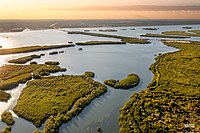
Photo from wikipedia
This study demonstrates the importance of considering potential land use and management changes in climate impact research. By taking into account possible trends of economic development and environmental awareness, we… Click to show full abstract
This study demonstrates the importance of considering potential land use and management changes in climate impact research. By taking into account possible trends of economic development and environmental awareness, we assess effects of global warming on water availability and quality in the catchments of four European lagoons: Ria de Aveiro (Portugal), Mar Menor (Spain), Vistula Lagoon (Poland and Russia), and Tyligulskyi Liman (Ukraine). Different setups of the process-based soil and water integrated model (SWIM), representing one reference and four socio-economic scenarios for each study area: the “business as usual”, “crisis”, “managed horizons”, and “set-aside” scenarios are driven by sets of 15 climate scenarios for a reference (1971–2000) and near future (2011–2040) scenario period. Modeling results suggest a large spatial variability of potential impacts across the study areas, due to differences in the projected precipitation trends and the current environmental and socio-economic conditions. While climate change may reduce water and nutrients input to the Ria de Aveiro and Tyligulsyi Liman and increase water inflow to the Vistula Lagoon the socio-economic scenarios and their implications may balance out or reverse these trends. In the intensely managed Mar Menor catchment, climate change has no notable direct impact on water resources, but changes in land use and water management may certainly aggravate the current environmental problems. The great heterogeneity among results does not allow formulating adaptation or mitigation measures at pan-European level, as initially intended by this study. It rather implies the need of a regional approach in coastal zone management.
Journal Title: Environmental Management
Year Published: 2019
Link to full text (if available)
Share on Social Media: Sign Up to like & get
recommendations!